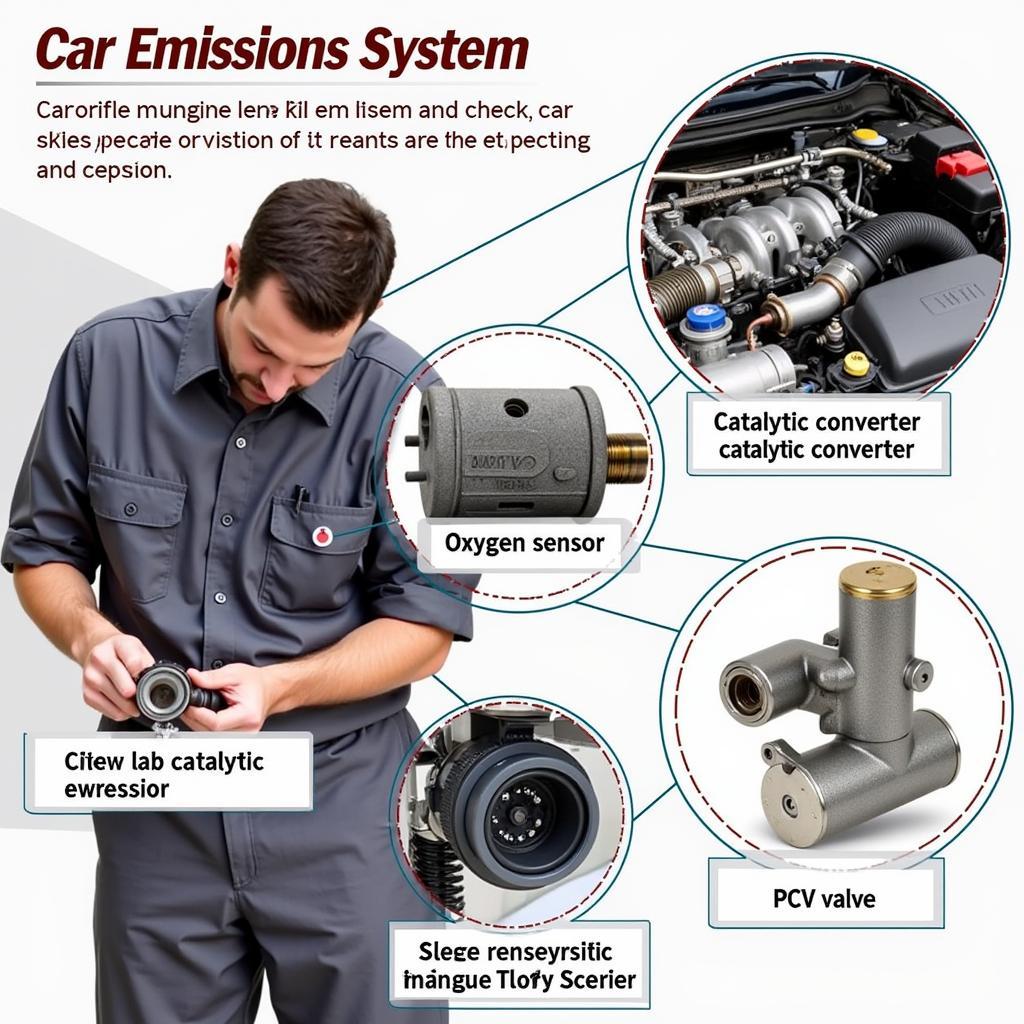Car maintenance plays a crucial role in passing your smog test. Regular upkeep can significantly impact your vehicle’s emissions and overall performance, making the difference between a passing and failing grade. This article explores the crucial link between car maintenance and smog test results, providing valuable insights for car owners, mechanics, and automotive technicians alike.
How Car Maintenance Impacts Your Smog Test
Regular car maintenance is like giving your car a health checkup. It ensures all components are working efficiently, which directly affects the emissions your car produces. Neglecting routine maintenance can lead to increased emissions, potentially causing your car to fail a smog test. This can be a costly mistake, resulting in repairs and retesting fees.
- Oxygen Sensor: A faulty oxygen sensor can’t accurately measure the oxygen levels in the exhaust, leading to incorrect fuel-to-air ratios and higher emissions.
- Catalytic Converter: A clogged or damaged catalytic converter won’t effectively convert harmful pollutants into less harmful substances.
- Spark Plugs: Worn-out spark plugs can cause misfires, leading to incomplete combustion and increased hydrocarbon emissions.
- PCV Valve: A malfunctioning PCV valve can disrupt the flow of gases, causing pressure buildup and increased emissions.
 Faulty Oxygen Sensor Impact on Smog Test
Faulty Oxygen Sensor Impact on Smog Test
Does Regular Oil Changes Help with Smog Tests?
You might be surprised to learn that even simple oil changes can affect smog test results. Dirty oil can contaminate the combustion process, increasing emissions. Regular oil changes ensure the engine runs smoothly and efficiently, minimizing pollutants. Think of it like giving your car fresh blood; it helps everything run cleaner.
What Maintenance Should Be Done Before a Smog Test?
To maximize your chances of passing a smog test, consider the following maintenance tasks:
- Check Engine Light: Address any illuminated check engine lights promptly. This light often indicates underlying issues that can impact emissions.
- Tune-Up: A comprehensive tune-up can address various components affecting emissions, such as spark plugs, air filters, and fuel injectors.
- Emissions System Inspection: Specifically inspect the components directly related to emissions, such as the oxygen sensor, catalytic converter, and PCV valve.
- Fuel System Cleaning: Cleaning the fuel system can remove deposits and improve fuel efficiency, reducing emissions.
“A well-maintained vehicle is more likely to pass a smog test,” states John Miller, a seasoned automotive engineer with over 20 years of experience. “Regular maintenance not only reduces emissions but also improves overall vehicle performance and longevity.”
 Car Emissions System Inspection Before Smog Test
Car Emissions System Inspection Before Smog Test
Does Car Maintenance Affect Smog Test: Common Misconceptions
Some believe a newly maintained car automatically guarantees a passing smog test. While maintenance significantly increases your chances, it doesn’t eliminate the possibility of an underlying issue. It’s crucial to understand that even well-maintained cars can develop problems.
“Preventive maintenance is key,” adds Sarah Johnson, a certified emissions specialist. “Addressing potential issues proactively can save you time and money in the long run.”
Conclusion
Does Car Maintenance Affect Smog Test results? Absolutely. Regular maintenance is essential for minimizing emissions and improving your chances of passing a smog test. From simple oil changes to addressing check engine lights, every bit counts. Don’t wait until your smog test to address potential issues. Proactive maintenance is a smart investment in your vehicle’s health and your wallet. For further assistance or personalized guidance, connect with us at AutoTipPro at +1 (641) 206-8880. Our office is located at 500 N St Mary’s St, San Antonio, TX 78205, United States. We are here to help you navigate the complexities of car maintenance and ensure your vehicle is in top shape for your next smog test.
FAQ:
- How often should I get my car serviced for emissions?
- What are the most common reasons for failing a smog test?
- Can I perform emissions-related maintenance myself?
- How much does a smog test typically cost?
- What happens if I fail my smog test?
- How can I improve my car’s fuel efficiency?
- What are the long-term benefits of regular car maintenance?




Leave a Reply